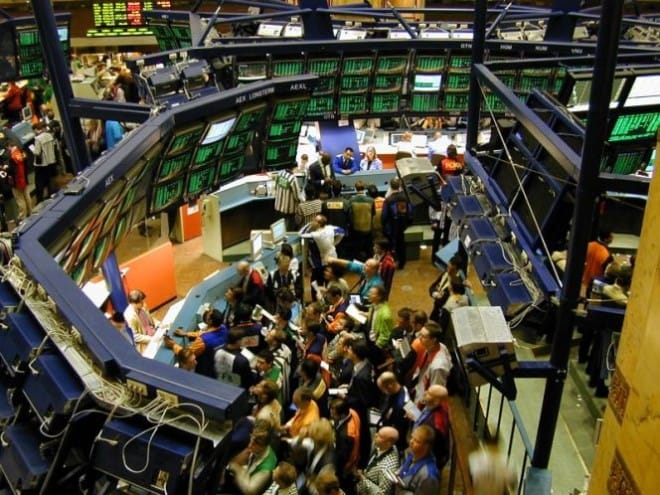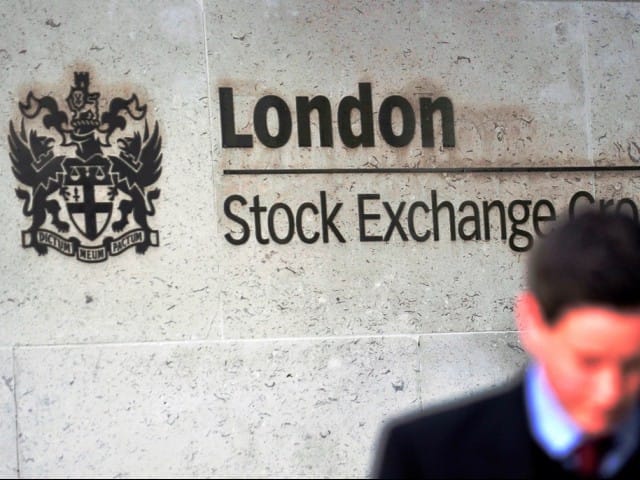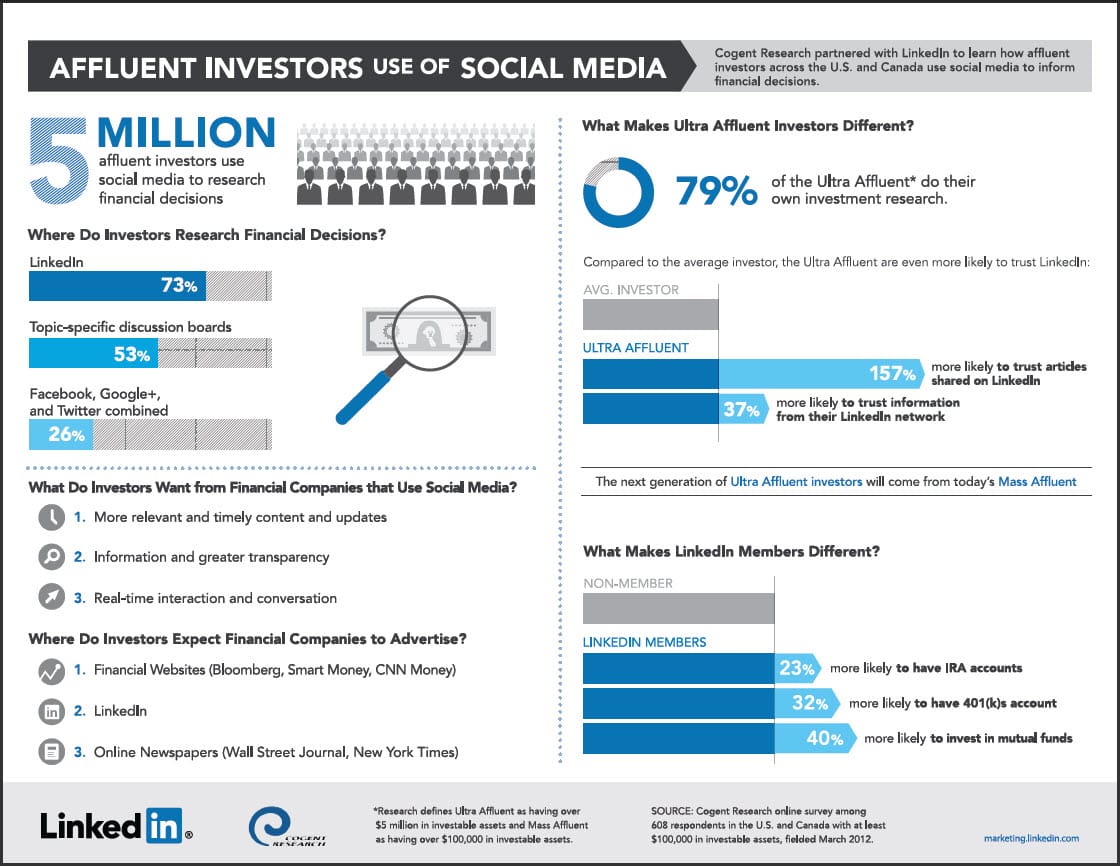Investing is a bold and engaging initiative that needs dedication and passion. A true investor is someone that dedicates his time and passion to gather knowledge and engineers his or hers life towards a different way of self directed investment operating. With the advent of digital and social media there are available more resources than ever for people to invest and any wannabe investor has more tools and instruments than ever to learn, exchange true knowledge and become an effective social investor, being able to manage his investments in right and profitable ways using the best social media resources and digital tools. And investors are using it very seriously, special affluent investors as the bellow infographic shows:
The stockmarket can seem like a daunting experience to the first time investor, and the crash of 2008 has not helped fears that investing on the stockmarket can be a risky business. However, in the middle of all the chaos and insecurities going on in the financial world there are a lot of excellent projects emerging and going on, specially in the crossroad of digital and social investing for self directed investors. Investors can become successful and making money from investing using new advanced digital and social media financial tools in the right way. But to become a successful investor, you first need to get to grips with some of the investing basics and be a savvy financial and investment researcher and continuous invest in your education and tech and social media skills.
There are two types of investors: institutional and retail. Institutional investors are the big financial or investing players based in WallStreet, London City, Hon Kong, Singapore and Switzerland. But the opportunities in social investing are there for typical investors that invest on their own, the retail investors, self directed investors as they are called as well. And for retail investors, web and social media are powerful tools that if well used can create serious investment financial results. But it is not easy and it all comes to hard work and dedication.
With the advent of the web and social media, investment is no longer just an activity for banks, bankers or financial experts. These new possibilities of democratization of the financial industry is possible thanks to the high development of tech and content access to data, stats, financial stock data and numbers in the web, digital and social media platforms, technologies, applications available to a much big number of people. Investing is something that can be done now remotely, mobile with a laptop, iPad, any tablet, smart phone and a good web, internet connection and it is more than ever an activity that is available to any investor. But critical is that it needs deep engagement, research, high education, management of risk versus reward and training and access to data, information. This is why it is beneficial to work with an investment holding company that can do all this for you.
Bloomberg was one of the first companies that went to become one of the world top financial entities thanks to the way he used innovative technology. The Bloomberg terminal in the epicenter of markets, traders and investors all over the world managed to achieve so much success due to the way it managed the best of tech, restrictive cable communications, and afterwards the internet to link infrastructures, data and systems across organisations. Ironically after some decades there are some social investing platforms that offer very advanced product features that can make any individual investor very successful with similar platforms but much less expensive.
After the advent of concepts and activities such as digital word of mouth, viral marketing, content development, crowd-sourcing, peer to peer funding and finance, social editing, social news (Google News and many other RSS feeds), social bookmarking, social editing and now with the advent of apps a new trend is taking off – social investing. Still a disruption to the system, social investing and social stock markets, based in the world of tech, digital cloud computing data connected terminals in real time, are coming to the market so far dominated by insiders and experts: the finance industry.
Online trading brokerages and in part the big Wall Street players have been using high tech, algorithm trading to optimise trading systems and get the best of data to manage they trading and investing systems, and have been part of this accelerated shift towards social investing. However it is in the retail industry, (special in the Forex space of retail investing and trading) since E*Trade pioneered the market in the early ’90s, followed by players such as FXCM, Saxo Bank, Oanda, IG Markets, CMC Markets, GFT Markets, Alpari that bigger opportunities and more advanced use of social media and technologies have been opening significant new doors to investors.
With the advent of search indexation, social media algorithm web and new advanced technologies an onslaught of advanced tech and finance entrepreneurs, new media experts, and financial analysts are disrupting or reforming and optimising the traditional investing model on Wall Street and the City financial pole positions. These new advanced financial and tech players want to open the valves of financial and investing information to a mass audience of investors not experts. The challenge though is about how to use these very advanced tools that need still high or professional education, training.
Websites such as finance.yahoo.com, google.com/finance, Investopedia.com, stockopedia.co.uk, etoro.com, covestor.com, zecco.com, wikinvest.com, Marketocracy.com, caps.fool.com, socialpicks.com, Stockpickr.com, Vestopia.com, The UpDown.com, BullPoo.com, higherlogic.com, socialfunds.com to name a few important names have been creating and working in very advanced platforms with serious features and solutions for investing.
Introduction to the Social Stock Market
 A stock market is a network of economic transactions which enables the trading of company stock, otherwise known as shares, and derivatives at an agreed price. These are known as securities and are listed on a stock exchange as well as traded privately. But Stock Markets are increasingly becoming social. What I mean is that the data now managed in the financial transactions has in its DNA social media data coming from social sentiment about given stocks and some news or information announced in the social space related associated with markets can influence the value of a give stock or currency.
A stock market is a network of economic transactions which enables the trading of company stock, otherwise known as shares, and derivatives at an agreed price. These are known as securities and are listed on a stock exchange as well as traded privately. But Stock Markets are increasingly becoming social. What I mean is that the data now managed in the financial transactions has in its DNA social media data coming from social sentiment about given stocks and some news or information announced in the social space related associated with markets can influence the value of a give stock or currency.
“I never attempt to make money on the stock market. I buy on the assumption that they could close the market the next day and not reopen it for five years. ” Warren Buffett
A stock market is a way for companies to raise money if they need to finance expansion plans for example. They can raise these capital sums by selling shares in the business to public and institutional investors. The shareholders then own a small percentage of the company and are entitled to a share in any profits. Any profits earned are distributed by way of a dividend payment. But this is now done with access to many tools and most of the traders and investors are looking at the Twitter feeds, LinkedIn profiles, groups of big companies, (its managers and data) stock exchanges and even news and data launched faster than ever through the real time social web.
The Global new roles for Stock Exchanges and London Stock Exchange Social Media Adoption
The global stocks exchanges have a new role that is no longer just financial but the whole sum of technologies and regulatory information most of it communicated through the social wires and adapted according to sentiment of the markets and algorithms. That is why most of teh stock exchanges are adopting social media policies and understanding they have to adpat to the social markets.
The UK’s London Stock Exchange is one of the oldest and largest exchanges in the world and they are now adopting social media signals. Traditionally it deals with companies coming to the market – new issues or initial public offerings (IPO) – and investors keen to own a part of a company. Shares are first issued in the primary market, and then traded in the secondary market. Around 99% of the Exchange’s business takes place in this market of “second hand” stock. But now the London Stock Exchange is going the extra mile. recently Social 360 started providing daily insight and analysis from social media sites for the London Stock Exchange and its range of brands.
Social 360 Monitoring is one of the companies that are working to make social signs part of the stock markets. Social 360 Monitoring’s COO Paddy Herridge said the stock exchange are now facing “unique challenges” as they need to start monitoring new subjects and signals for social media monitoring. In his words: “The breadth of its business operations and the specialisms it has, combined with the challenges a three-letter abbreviation such as LSE presents, means that it requires a human-filtered approach to generate the quality and concision of insight that the press office requires”.
Joining the Social Stock Market- Making the best use of Social Media for Investing
If companies wish to join the main market, they have to meet certain criteria specified by the right Stock Exchanges criteria. However for investing the criteria is what to invest and how to invest. It can be a small or a big amount the important is to have the right strategy and position.
And using social media is now critical for investors. According to a recent study five million affluent investors use social media to research financial decisions, and almost three times as many of those choose LinkedIn over Facebook, Twitter and Google+ combined? From this study one of the conclusions is that 73 percent of investors use LinkedIn for financial analysis, ahead of topic-specific discussion boards (53 percent). Facebook, Google+ and Twitter on the other hand account for 26 percent of investor attention. However Twitter is increasing its paper in investing as the early bird for peer to peer information exchange.
Investors have a massive opportunity with the advent of innovation and social media new technologies and platforms. Social media is relevant for investing and its power it is only in its early days and timely right content, greater transparency and real-time interaction and conversation between social media investors in the right platforms can indeed make any investor much more aware and better in his or her’s performance.
But very important to bear in mind:
- Social Investing usage needs careful risk management for investor relations;
- It is critical that investors know their audiences, languages and special know how to use the right channels;
- Different audiences need different media channels, adapted localised approaches and right strategies.
- Social media offers the benefit of immediate information but needs serious filtering and management.
Read More:
How to buy low sell high ? (In forex and crypto)
Dinis Guarda is an author, academic, influencer, serial entrepreneur and leader in 4IR, AI, Fintech, digital transformation and Blockchain. With over two decades of experience in international business, C level positions and digital transformation, Dinis has worked with new tech, cryptocurrencies, drive ICOs, regulation, compliance, legal international processes, and has created a bank, and been involved in the inception of some of the top 100 digital currencies.
Dinis has created various companies such as Ztudium tech platform a digital and blockchain startup that created the software Blockimpact (sold to Glance Technologies Inc) and founder and publisher of intelligenthq.com, hedgethink.com, fashionabc.org and tradersdna.com. Dinis is also the co-founder of techabc and citiesabc, a digital transformation platform to empower, guide and index cities through 4IR based technologies like blockchain, AI, IoT, etc.
He has been working with the likes of UN / UNITAR, UNESCO, European Space Agency, Davos WEF, Philips, Saxo Bank, Mastercard, Barclays and governments all over the world.
He has been a guest lecturer at Copenhagen Business School, Group INSEEC/Monaco University, where he coordinates executive Masters and MBAs.
As an author, Dinis Guarda published the book 4IR: AI, Blockchain, FinTech, IoT, Reinventing a Nation in 2019. His upcoming book, titled 4IR Magna Carta Cities ABC: A tech AI blockchain 4IR Smart Cities Data Research Charter of Liberties for our humanity is due to be published in 2020.
He is ranked as one of the most influential people in Blockchain in the world by Right Relevance as well as being listed in Cointelegraph’s Top People In Blockchain and Rise Global’s The Artificial Intelligence Power 100. He was also listed as one of the 100 B2B Thought Leaders and Influencers to Follow in 2020 by Thinkers360.


































